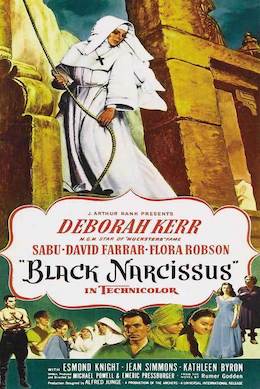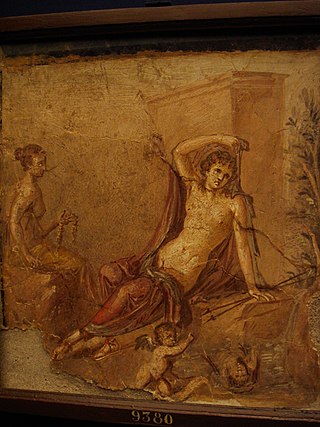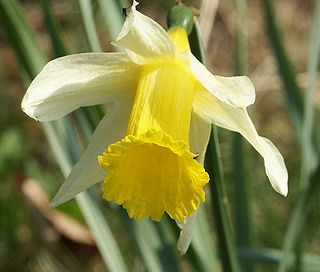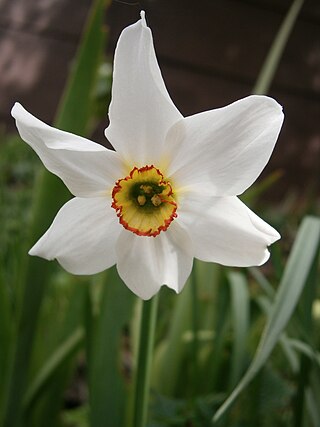
In Greek mythology, Narcissus was a hunter from Thespiae in Boeotia who was known for his beauty which was noticed by all. According to the best known version of the story, by Ovid, Narcissus rejected all advances, eventually falling in love with a reflection in a pool of water, tragically not realizing its similarity, entranced by it. In some versions, he beat his breast purple in agony at being kept apart from this reflected love, and in his place sprouted a flower bearing his name.

In Greek mythology, Echo was an Oread who resided on Mount Cithaeron. Zeus loved consorting with beautiful nymphs and often visited them on Earth. Eventually, Zeus's wife, Hera, became suspicious, and came from Mount Olympus in an attempt to catch Zeus with the nymphs. Echo, by trying to protect Zeus, endured Hera's wrath, and Hera made her only able to speak the last words spoken to her. So when Echo met Narcissus and fell in love with him, she was unable to tell him how she felt and was forced to watch him as he fell in love with himself.

Black Narcissus is a 1947 British psychological drama film jointly written, directed and produced by Michael Powell and Emeric Pressburger, based on the 1939 novel by Rumer Godden. It stars Deborah Kerr, Sabu, David Farrar, and Flora Robson, and features Esmond Knight, Jean Simmons, and Kathleen Byron.
In Greek mythology, Liriope or Leiriope is a Boeotian naiad of Thespiae, who was probably the daughter of one of the Boeotian or Phocian river gods. Liriope was raped by the river-god Cephissus, who was himself the son of Pontus and Thalassa, and bore his son Narcissus.

Narcissus is a genus of predominantly spring flowering perennial plants of the amaryllis family, Amaryllidaceae. Various common names including daffodil, narcissus, and jonquil, are used to describe all or some members of the genus. Narcissus has conspicuous flowers with six petal-like tepals surmounted by a cup- or trumpet-shaped corona. The flowers are generally white and yellow, with either uniform or contrasting coloured tepals and corona.

Stachys the Apostle was the second bishop of Byzantium, from 38 AD to 54 AD according to tradition.

The Nigger of the "Narcissus": A Tale of the Forecastle, first published in the United States as The Children of the Sea, is an 1897 novella by Polish-British novelist Joseph Conrad. The central character is an Afro-Caribbean man who is ill at sea while aboard the trading ship Narcissus heading towards London. Due to the offensiveness of the word nigger in the title, it was renamed The Children of the Sea: A Tale of the Forecastle for the 1897 US edition.

Echo and Narcissus is a myth from Ovid's Metamorphoses, a Roman mythological epic from the Augustan Age. The introduction of the mountain nymph, Echo, into the story of Narcissus, the beautiful youth who rejected Echo and fell in love with his own reflection, appears to have been Ovid's invention. Ovid's version influenced the presentation of the myth in later Western art and literature.

The British film-making partnership of Michael Powell (1905–1990) and Emeric Pressburger (1902–1988)—together often known as The Archers, the name of their production company—made a series of influential films in the 1940s and 1950s. Their collaborations—24 films between 1939 and 1972—were mainly derived from original stories by Pressburger with the script written by both Pressburger and Powell. Powell did most of the directing while Pressburger did most of the work of the producer and also assisted with the editing, especially the way the music was used. Unusually, the pair shared a writer-director-producer credit for most of their films. The best-known of these are The Life and Death of Colonel Blimp (1943), A Canterbury Tale (1944), I Know Where I'm Going! (1945), A Matter of Life and Death (1946), Black Narcissus (1947), The Red Shoes (1948), and The Tales of Hoffmann (1951).

Metamorphosis of Narcissus is an oil-on-canvas painting by the Spanish surrealist Salvador Dalí, from 1937. Originally titled Métamorphose de Narcisse, This painting is from Dalí's paranoiac-critical period and depicts his interpretation of the Greek myth of Narcissus. Dalí began his painting in the spring of 1937 while in Zürs, in the Austrian Alps.

Narcissus pseudonarcissus, commonly named the wild daffodil or Lent lily, is a perennial flowering plant.

Narcissus poeticus, the poet's daffodil, poet's narcissus, nargis, pheasant's eye, findern flower or pinkster lily, was one of the first daffodils to be cultivated, and is frequently identified as the narcissus of ancient times. It is also often associated with the Greek legend of Narcissus. It is the type species of the genus Narcissus and is widely naturalised in North America.

Saint Narcissus of Jerusalem was an early patriarch of Jerusalem. He is venerated as a saint by both the Western and Eastern Churches. In the Roman Catholic Church, his feast day is celebrated on October 29, while in the Eastern Orthodox Church it is celebrated on August 7.

Echo and Narcissus is a 1903 oil painting by John William Waterhouse. It illustrates the myth of Echo and Narcissus from Ovid's Metamorphoses.

Narcissus is a painting by the Italian Baroque master Caravaggio, painted circa 1597–1599. It is housed in the Galleria Nazionale d'Arte Antica in Rome.

The taxonomy of Narcissus is complex, and still not fully resolved. Known to the ancients, the genus name appears in Graeco-Roman literature, although their interest was as much medicinal as botanical. It is unclear which species the ancients were familiar with. Although frequently mentioned in Mediaeval and Renaissance texts it was not formally described till the work of Linnaeus in 1753. By 1789 it had been grouped into a family (Narcissi) but shortly thereafter this was renamed Amaryllideae, from which comes the modern placement within Amaryllidaceae, although for a while it was considered part of Liliaceae.

HMS Narcissus was the lead ship of the Royal Navy Narcissus-class 32-gun fifth-rate frigates, launched in 1801. She participated in the War of 1812.
Black Narcissus is a drama television serial, based on the 1939 novel by Rumer Godden. The series features one of the final performances of Diana Rigg, who died in September 2020. The drama premiered on November 23, 2020, on FX in the US, and on December 27, 2020, on BBC One in the UK.
















